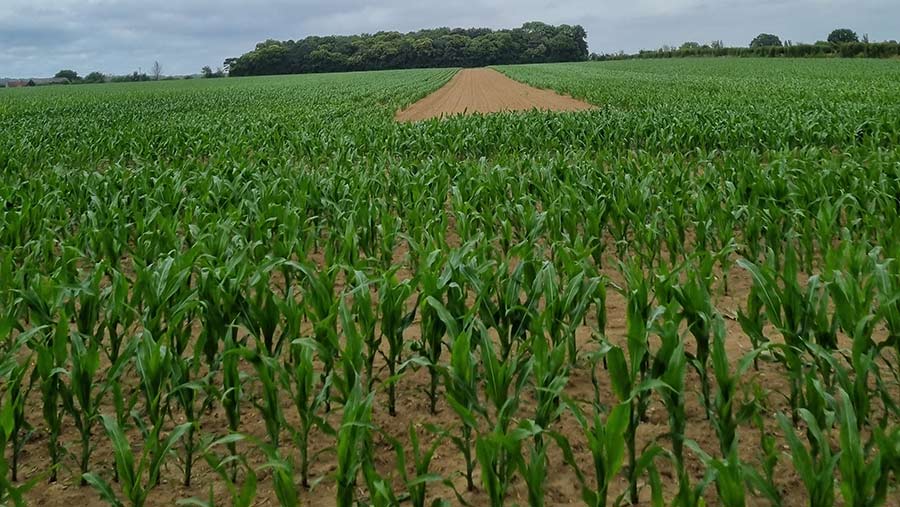Farmer’s maize trial shows vital need for treated seed
 The strip of untreated maize was sabotaged by corvids in Essex © Dan Wormell
The strip of untreated maize was sabotaged by corvids in Essex © Dan Wormell A farmer’s untreated maize strip has highlighted the pressing need for government to ensure growers have continued access to bird-repelling seed treatments.
Dan Wormell, who farms 600ha at Langenhoe, near Colchester, Essex, planted a 300m strip of untreated grain maize seed last year to compare the results with crops drilled with treated seed.
Due to the dry growing season yields were down on the average of 9t/Ha despite the treated seeds showing strong initial establishment. But the strip of maize seed that was not treated with Korit bird repellent was sabotaged by corvids soon after it was drilled on 16 May – and no crop emerged.
See also: Maize growers face prospect of untreated seed next year
Mr Wormell described the results of the trial as “drastic”, saying it demonstrates why the UK authorities must re-register vital bird-repelling pesticides for the 2024 growing season.
“If we don’t get these bird repellents reapproved it’s going to cost maize growers a lot of money. Many will just decide not to grow the crop,” he added.
Mr Wormell warned of a long list of the “unintended consequences” of maize growers losing bird repellents from their toolbox for 2024, including heavier reliance on already under pressure pesticides, added pressure on crop rotations and threats to farm profitability, food security, energy security and increased imports.
He likened the situation to oilseed rape growers losing access to neonicotinoid-based seed treatments, which has rendered growing the crop too risky in parts of England due to the threat of flea beetle damage to crops.
Licences up for renewal
The Maize Growers Association says the licences for three important seed treatments for maize – Redigo M, Korit 420 FS and Force 20 CS – are due to expire on 1 January 2024.
Because of regulations connected to Brexit, all pesticides used in the UK must be approved on the GB Pesticides Approvals Register and these three important seed treatments have not yet been added to the register by the Chemicals Regulation Division (CRD).
Independent consultant Dr Julian Little said Mr Wormell’s field trials show the difficulties of trying to grow a good crop of maize with untreated seed.
“If we don’t find a solution for the 2024 growing season, we will be in big trouble as regards the future of growing forage maize or maize for AD plants,” he added.
Farmers Weekly has requested comments from Defra and the CRD, an agency of the Health and Safety Executive, which is responsible for the registration of plant protection products.

